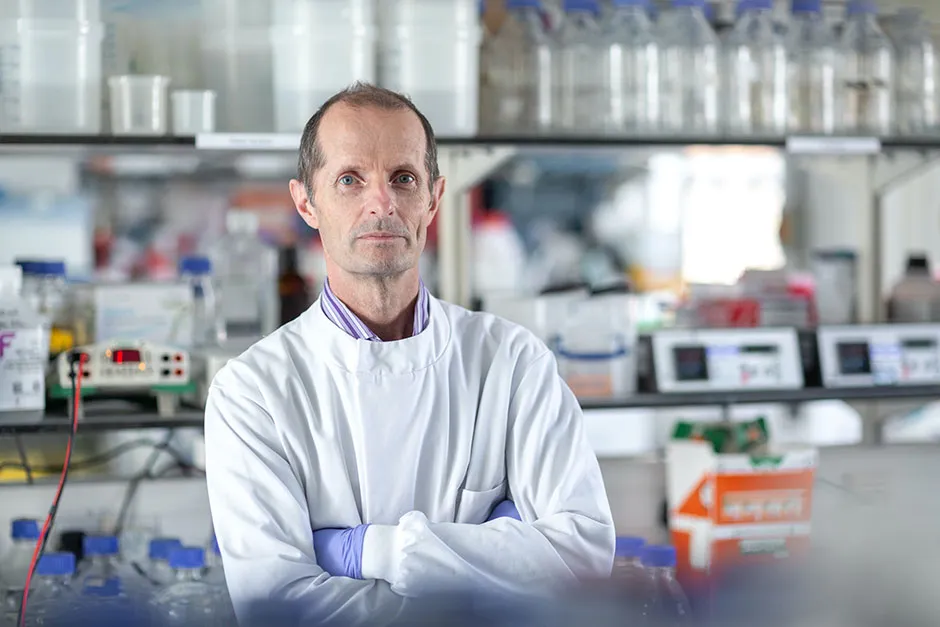A COVID-19 vaccine could be rolled out across the country in the first half of next year if trials are successful, according to a scientist leading research in the UK.
Professor Robin Shattock, who heads a team developing a coronavirus vaccine at Imperial College London, said that enough doses would be available for everyone in the UK if trials go “really well”.
But he warned there was “no certainty” that any of the coronavirus vaccines currently being developed will be successful, as it is dependent on the level of immunity needed to prevent infection.
Read more about a COVID-19 vaccine:
- Coronavirus vaccines: Where are we now?
- Oxford vaccine: trial on pigs 'boosts coronavirus immune response'
Appearing on Sky News’ Sophy Ridge On Sunday, he said: “So we anticipate if everything goes really well that we’ll get an answer as to whether it works by early next year. And we have put in place the infrastructure to make that vaccine for the whole of the UK.
“So, assuming that the funding is there to purchase that vaccine, we could have that vaccine rolled out across the UK in the first half of next year.”
Some 15 volunteers have been vaccinated for the trial so far, which will be ramped up to include another 200-300 participants in the “coming weeks”, he said.
Scientists developing a vaccine currently do not know what level of immunity people need to prevent infection, which makes the chance of success “difficult to predict”, according to Prof Shattock.

“If you only need a very small amount of immunity, I suspect most of the vaccines that are being developed will actually work, but if you need a very strong immune response or particular quality of immune response, we’ll see that actually it will be shaking out to some of these candidates,” he told the programme.
“We hope we will be the candidate, one of the candidates, that is successful, but there’s no certainty with any individual approach.”
Although development is also taking place at the University of Oxford, Prof Shattock said that a vaccine being made available by September “feels very optimistic” – partly due to the number of infections falling in the UK.
Read more coronavirus news:
- Wildlife testing and tracking needed to avoid future pandemics
- Coronavirus: WHO acknowledge 'emerging evidence' for airborne spread
Asked if there was a chance a vaccine might not work, he replied: “Now I think that’s a very low, low risk. I think we’re very lucky in the UK that we have two very strong candidates, the one from Imperial, the one from Oxford, and so we’re pretty well placed, but there’s still not a certainty that either of those two will work.”
Due to the urgency of the coronavirus crisis, any vaccine will need to be introduced “very cautiously”, according to Prof Shattock, as the normal full trials will not take place.
“I think the wire pressure is actually there’s such a push to develop a vaccine that normally, we would study a vaccine for two years before we made it widely available to the general public,” he told the programme.“And of course, we won’t have two years of safety for this vaccine or any of the vaccines that are being developed.
“And so they still will need to be introduced very cautiously, with long-term follow up, as that pressure to get a vaccine in and to get economies up and running is really very strong.”
How do scientists develop vaccines for new viruses?
Vaccines work by fooling our bodies into thinking that we’ve been infected by a virus. Our body mounts an immune response, and builds a memory of that virus which will enable us to fight it in the future.
Viruses and the immune system interact in complex ways, so there are many different approaches to developing an effective vaccine. The two most common types are inactivated vaccines (which use harmless viruses that have been ‘killed’, but which still activate the immune system), and attenuated vaccines (which use live viruses that have been modified so that they trigger an immune response without causing us harm).
A more recent development is recombinant vaccines, which involve genetically engineering a less harmful virus so that it includes a small part of the target virus. Our body launches an immune response to the carrier virus, but also to the target virus.
Over the past few years, this approach has been used to develop a vaccine (called rVSV-ZEBOV) against the Ebola virus. It consists of a vesicular stomatitis animal virus (which causes flu-like symptoms in humans), engineered to have an outer protein of the Zaire strain of Ebola.
Vaccines go through a huge amount of testing to check that they are safe and effective, whether there are any side effects, and what dosage levels are suitable. It usually takes years before a vaccine is commercially available.
Sometimes this is too long, and the new Ebola vaccine is being administered under ‘compassionate use’ terms: it has yet to complete all its formal testing and paperwork, but has been shown to be safe and effective. Something similar may be possible if one of the many groups around the world working on a vaccine for the new strain of coronavirus (SARS-CoV-2) is successful.
Read more: